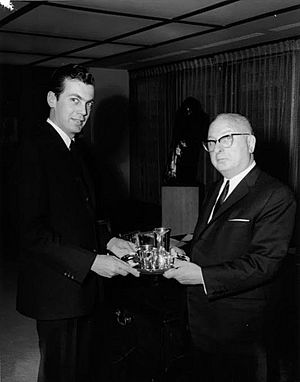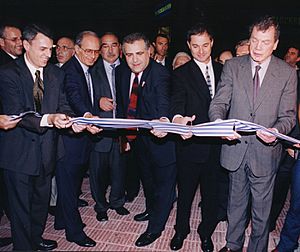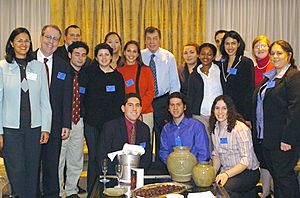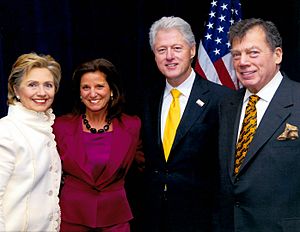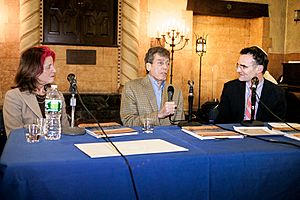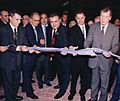Edgar Bronfman Sr. facts for kids
Quick facts for kids
Edgar Bronfman Sr.
|
|
|---|---|
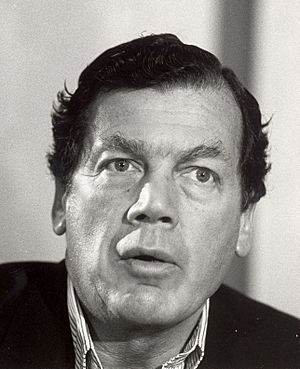
Edgar Bronfman in 1989
|
|
| Born |
Edgar Miles Bronfman
June 20, 1929 Montreal, Quebec, Canada
|
| Died | December 21, 2013 (aged 84) Manhattan, New York City, U.S.
|
| Citizenship | Canada United States |
| Education | Selwyn House School Trinity College School |
| Alma mater | Williams College McGill University (B.Com) |
| Occupation | Businessman, philanthropist |
| Spouse(s) |
Ann Margaret Loeb
(m. 1953; div. 1973)Rita Eileen Webb
(m. 1975; div. 1983)
Jan Aronson
(m. 1994) |
| Children | 7, including
|
| Parent(s) | Samuel Bronfman Saidye Rosner Bronfman |
| Relatives |
|
Edgar Miles Bronfman (born June 20, 1929 – December 21, 2013) was a Canadian-American businessman. He led his family's company, Seagram, which made alcoholic drinks. He became its president and CEO.
Bronfman is also well-known for his work as president of the World Jewish Congress. He helped improve relations with the Soviet Union. This led to the Hebrew language being allowed in the USSR. It also helped Soviet Jews practice their religion freely. Many were also able to move to Israel.
Contents
Biography
Edgar Bronfman was born in Montreal, Canada. His family was Jewish-Canadian. His father, Samuel Bronfman, came from Russia. His mother, Saidye Rosner Bronfman, was born in Manitoba. Edgar was one of four children.
In 1925, his father and uncle built their first distillery. A distillery is a place where alcoholic drinks are made. They later bought a distillery from the Seagram family. They then used the Seagram name for their company. Edgar later took charge of the Seagram business in the U.S.
Edgar had two older sisters, Phyllis and Minda. He also had a younger brother, Charles Bronfman. The family had a Jewish upbringing. Edgar went to private schools in Canada. He attended Selwyn House School and Trinity College School. He later studied at Williams College and McGill University. He earned a degree in commerce in 1951.
Career
Seagram
After finishing college in 1951, Edgar joined the family business. He started as an accounting clerk. He also learned to taste the drinks. In 1953, he became the head of Seagram's U.S. branch.
He helped the company grow a lot. He added more products and improved how they were sold. He also expanded Seagram's business to many more countries. In 1971, after his father passed away, Edgar became the president and director of Seagram. His son, Edgar Bronfman Jr., later took over as CEO in 1994.
World Jewish Congress
In 1979, Edgar Bronfman became the acting head of the World Jewish Congress (WJC). This is an international organization that represents Jewish communities. He was formally elected president in 1981.
He worked with his deputy, Israel Singer, to lead the WJC. They started important projects. These included helping Jews in the Soviet Union gain freedom. They also worked to expose the past of Austrian president Kurt Waldheim. Another big effort was helping victims of the Holocaust get back what they lost.
Important Projects
Helping Soviet Jews
In 1985, Bronfman visited Moscow. He was the first WJC president to meet with Soviet officials. He met with Mikhail Gorbachev, the Soviet leader. They talked about allowing Soviet Jews to leave the country.
Bronfman believed that business ties could help. He thought that if the Soviet Union wanted to trade more, they would need to address the issue of Jewish freedom. He explained that it was a matter of negotiation.
In 1987, Bronfman returned to Moscow. He continued to push for the freedom of Jews in the Soviet Union. He wanted them to be able to practice their religion. He also wanted them to be able to learn Hebrew, which was not allowed then.
In 1988, he met with Soviet Foreign Minister Eduard Shevardnadze. This meeting led to good news. The Soviets agreed to allow Hebrew to be taught. They also agreed to open a Jewish cultural center in Moscow. Bronfman saw this as a sign that they were serious about Jewish rights.
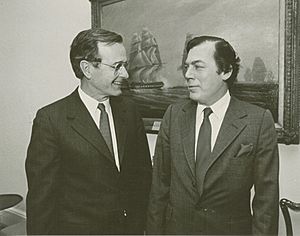
Kurt Waldheim
In 1986, the World Jewish Congress made a serious accusation. They said that Austrian president Kurt Waldheim had hidden his past. They claimed he had connections to the Nazi Party during World War II.
The WJC showed evidence that Waldheim had served in the German army. This unit was involved in sending Greek Jews to concentration camps. The accusations caused a big public scandal for Waldheim.
Bronfman stated that Waldheim was "part and parcel of the Nazi killing machine." Waldheim tried to sue Bronfman, but he later dropped the lawsuit.
Swiss Bank Restitution
In the late 1990s, Bronfman led an effort to help Holocaust survivors. He pushed for Swiss banks to return money. This money had been deposited by Jews before the Holocaust. Many of these people were later killed by the Nazis.
This effort led to a large agreement. Swiss banks agreed to pay $1.25 billion. This money was to resolve claims from Holocaust victims and their families. The agreement was approved in 2000.
Israel
Bronfman also spoke out on issues related to Israel. In 2003, he wrote a letter to President George W. Bush. He asked Bush to encourage Israel to slow down building a barrier in the West Bank. This showed that he believed in open discussion, even on sensitive topics.
Stepping Down
Bronfman stepped down as WJC president in 2007. His leadership helped make the World Jewish Congress a very strong organization. He is especially remembered for his work in helping Soviet Jews.
At his memorial service in 2014, Hillary Clinton spoke about him. She said, "Edgar was never shy of pressing an issue in the face of injustice." This showed how much he fought for what was right.
Personal life
Marriages and children
Bronfman was married five times. He married his third wife twice.
- Ann Margaret Loeb: They married in 1953 and divorced in 1973. They had five children:
- Samuel Bronfman II – In 1975, Samuel was abducted in New York. A ransom was paid, and the money was later recovered.
- Edgar Bronfman Jr.
- Matthew Bronfman
- Bhavani Lev (born Holly Bronfman) – She moved to India. In 1997, she co-founded Organic India. This company sells organic food and supplements. She has converted to Hinduism.
- Adam Bronfman – He is a managing director for The Samuel Bronfman Foundation.
- Lady Carolyn Townshend: They married in 1973. Their marriage was annulled in 1974.
- Rita Eileen Webb: They married in 1975. They divorced in 1983. They later remarried and divorced again. They had two children:
- Sara Bronfman (born 1976) – She is married to Libyan businessman Basit Igtet. They have one daughter.
- Clare Bronfman (born 1979)
- Jan Aronson: He married the artist Jan Aronson in 1994.
Death
Edgar Bronfman passed away on December 21, 2013. He was 84 years old. He was at his home in Manhattan. He was survived by his wife, seven children, 24 grandchildren, and two great-grandchildren.
Philanthropy
Edgar Bronfman was a very generous person. He gave a lot of money to Jewish causes. One important group he supported was Hillel: The Foundation for Jewish Campus Life. He helped revive Hillel in the 1990s. The Hillel center at New York University is named after him.
He also started the Bronfman Youth Fellowships in Israel. This program helps young Jewish leaders. He also provided funding for MyJewishLearning.com. This website offers information and education about Judaism.
Bronfman was also the founder and president of The Samuel Bronfman Foundation. This foundation works to support Jewish learning and community. It focuses on helping Jewish youth. It also promotes open and welcoming Jewish communities.
Some of the foundation's key projects include:
- The Bronfman Youth Fellowships in Israel: This program started in 1987. It brings together young Jews from Israel and North America. They explore Jewish texts and social responsibility.
- Hillel: The Foundation for Jewish Campus Life: This is the largest Jewish campus organization in the world. It helps Jewish students connect with their heritage.
- MyJewishLearning.com: This website offers articles and resources about all parts of Judaism. It also includes Kveller, a popular Jewish parenting website.
In 2012, Bronfman joined the Bill & Melinda Gates Foundation Giving Pledge. This is a promise by wealthy people to give away most of their money to charity.
After he died, many called him a "prince of his people." This was because of his dedication to the Jewish people. He believed in Jewish learning and giving back. He encouraged Jews to explore their heritage. He also believed that Jewish organizations should not use fear. Instead, they should inspire people to learn more about Judaism.
Awards
Edgar Bronfman received many honors.
- In 1986, he received the Chevalier de la Légion d'honneur from France. This is a very high award.
- In 1988, he received the Star of People's Friendship from East Germany.
- In 1999, U.S. President Bill Clinton gave him the Presidential Medal of Freedom. This is the highest civilian award in the United States.
- In 2000, he received the Leo Baeck Medal for his work promoting tolerance.
- In 2005, he received the Hillel Renaissance Award.
Works or publications
Edgar Bronfman also wrote several books:
- Bronfman, Edgar M., and Jan Aronson. The Bronfman Haggadah. New York: Rizzoli International Publications, 2012. ISBN: 978-0-8478-3968-1.
- Bronfman, Edgar M., and Beth Zasloff. Hope, Not Fear: A Path to Jewish Renaissance. New York: St. Martin's Press, 2008. ISBN: 978-0-3123-7792-2.
- Bronfman, Edgar M., and Catherine Whitney. The Third Act: Reinventing Yourself After Retirement. New York: G. P. Putnam, 2002. ISBN: 978-0-399-14869-9.
- Bronfman, Edgar M. Good Spirits: The Making of a Businessman. New York: Putnam, 1998. ISBN: 978-0-399-14374-8.
- Bronfman, Edgar M. The Making of a Jew. New York: Putnam, 1996. ISBN: 978-0-399-14220-8.
Articles and videos
Bronfman wrote for The Huffington Post and The Washington Post. He also appeared on The Charlie Rose Show.
Here are some videos and interviews with Edgar M. Bronfman:
- Tribute Video by the World Jewish Congress
- Interview for NY1
- Interview with Jacques Berlinerblau for Faith Complex Series
- Interview with The New York Times Magazine
Here is a video of his memorial service:
- Memorial Service
Images for kids
 | Isaac Myers |
 | D. Hamilton Jackson |
 | A. Philip Randolph |


